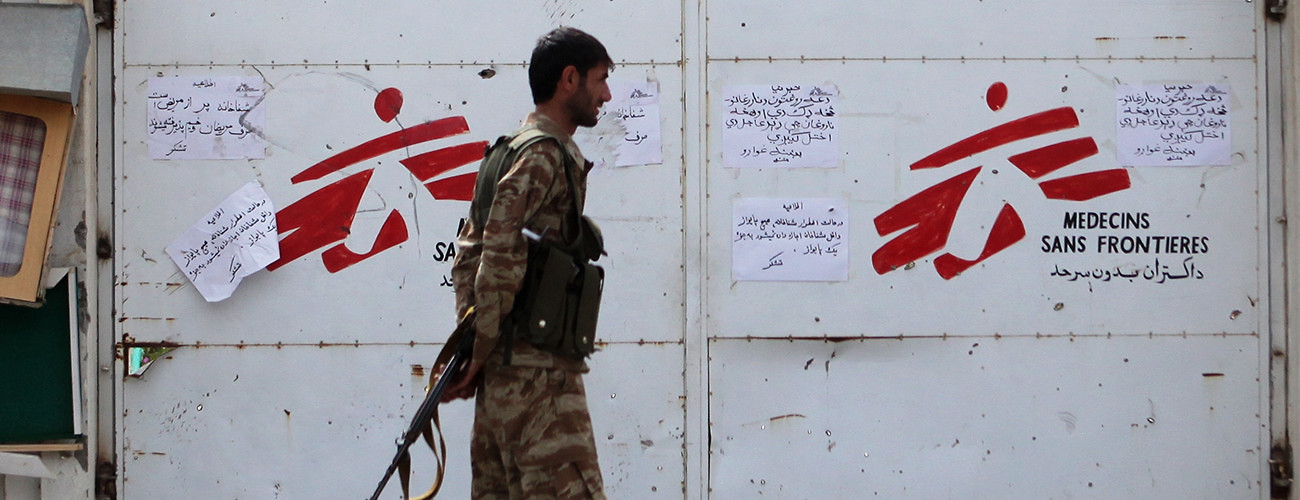A policeman stands guard in front of Medecins Sans Frontieres (MSF) hospital destroyed by a U.S. airstrike in Kunduz city, capital of northern Kunduz province of Afghanistan, Oct. 11, 2015. (Omid/Xinhua Press/Corbis)
The bombing by US military forces of a hospital in Afghanistan on October 3 has thrust the issue of respect for the laws of war into the spotlight. The attack on the medical facility run by Doctors Without Borders (also known as Médecins Sans Frontièrs, or MSF), which killed at least 22 civilians, may have violated international humanitarian law and has led to accusations by the medical charity that US military forces committed a “war crime.”
Now MSF is calling for an independent investigation by the International Humanitarian Fact-Finding Commission into the incident, which occurred in the city of Kunduz in northern Afghanistan. MSF has argued that the bombing has undermined the sanctity of the Geneva Conventions and damaged the integrity of the international humanitarian system.
Yet attacks on hospitals are hardly unprecedented. As IRIN notes, medical facilities and other protected spaces have come under attack in many recent conflicts, including Syria, Yemen, the Democratic Republic of the Congo, Gaza, and South Sudan. The International Committee for the Red Cross estimates that there were 2,398 violent incidents against healthcare facilities during 2012-2014 alone.
What’s more interesting is how this event (and MSF’s subsequent media campaign) reflects a larger debate taking place within the humanitarian community. While the media has focused on the immediate aftermath of the incident–including the perceived lack of justice and accountability and the need to bring to light the circumstances surrounding the attack on the morning of October 3–it could have wider implications for humanitarian action beyond the Afghan context.
The attack comes at a time of deep uncertainty about the future of humanitarianism. With humanitarian emergencies stretched to the limit–including the largest refugee crisis since the Second World War, frozen conflicts in the Middle East and sub-Saharan Africa, and catastrophic natural disasters–many have called into question the viability of the current humanitarian system.
In response to these disturbing trends, UN Secretary-General Ban Ki-moon will convene the largest gathering of humanitarian actors ever during the first-ever World Humanitarian Summit (WHS) in Istanbul in May 2016. NGOs, international organizations, and governments have already participated in more than a dozen consultations in order to lay the groundwork for the WHS, including the most recent dialogue in Geneva from October 14-16.
While the attack on the MSF hospital is unlikely to dramatically alter the course of the WHS discussions, it has the potential to refocus the conversation on some of the underlying challenges facing the humanitarian system which MSF sees as most urgent. These include a need for greater respect for the laws of war, independent delivery of aid on the basis of need as opposed to geopolitics, and more resources for the hardest hit areas, including Kunduz.
Not everyone shares the same priorities. The WHS deliberations have been the site of delicate disagreement between those who seek a “transformation in how we deliver [aid],” in the words of UN Deputy Secretary-General Jan Eliasson, and those who mostly seek to reaffirm, and reinforce, the current system. Such a transformation is perhaps most clearly embodied in a WHS proposal (cited in a synthesis report released this month) to introduce a “new framework of cooperation” between humanitarian, development, and peacebuilding actors. “A key objective for all of us must be to link humanitarian work to prevention, resilience and development,” Eliasson said.
Yet where the UN sees an opportunity to carry out its humanitarian, development, and peacebuilding activities as part of an integrated approach, MSF and other NGOs have warned that such efforts could compromise the fundamental humanitarian principles of impartiality, neutrality, and independence and direct resources towards long-term rather than acute needs. As stated in a 2012 report by the International Peace Institute on “Rethinking Humanitarianism,” there can be a “tension between addressing the causes of crises and upholding humanitarian principles.”
It’s also worth noting that the medical charity has expressed skepticism towards the WHS process and the UN-centered humanitarian system more broadly. In its July 2014 report “Where is Everyone? Responding to Emergencies in the Most Difficult Places,” MSF stated that the UN is “at the heart of the dysfunction” in humanitarian aid. It called for a higher level of prioritization attached to emergency response, greater financial investment, and a commitment by the UN and humanitarian agencies to work in risky areas with populations in dire need.
Speaking in her own capacity, the Executive Director of MSF-UK remarked that rather than focus on technical solutions, the WHS should engender “respect for the laws that govern conflict … and a reinforcement of [aid] independence.” Other MSF staff noted that the WHS is overlooking core humanitarian principles in favor of broad, unhelpful “innovations,” and that humanitarian actors should instead focus on “getting back to basics.”
It is impressive that in a few short weeks, MSF has captured global attention for the issue of respect for the laws of war, as well as public outrage towards those groups that would seek to harm medical workers and civilians (in contrast, the WHS deliberations have gone on for 18 months to little fanfare).
Even if MSF’s media campaign is unsuccessful in convincing President Barack Obama to agree to an independent investigation, it may help to reframe the debate around the importance of upholding core humanitarian principles that were established decades ago. As diplomats and humanitarians prepare to gather in Istanbul to guide the future of the humanitarian system, MSF is hosting a parallel conversation in which it is asking us to consider the past.





